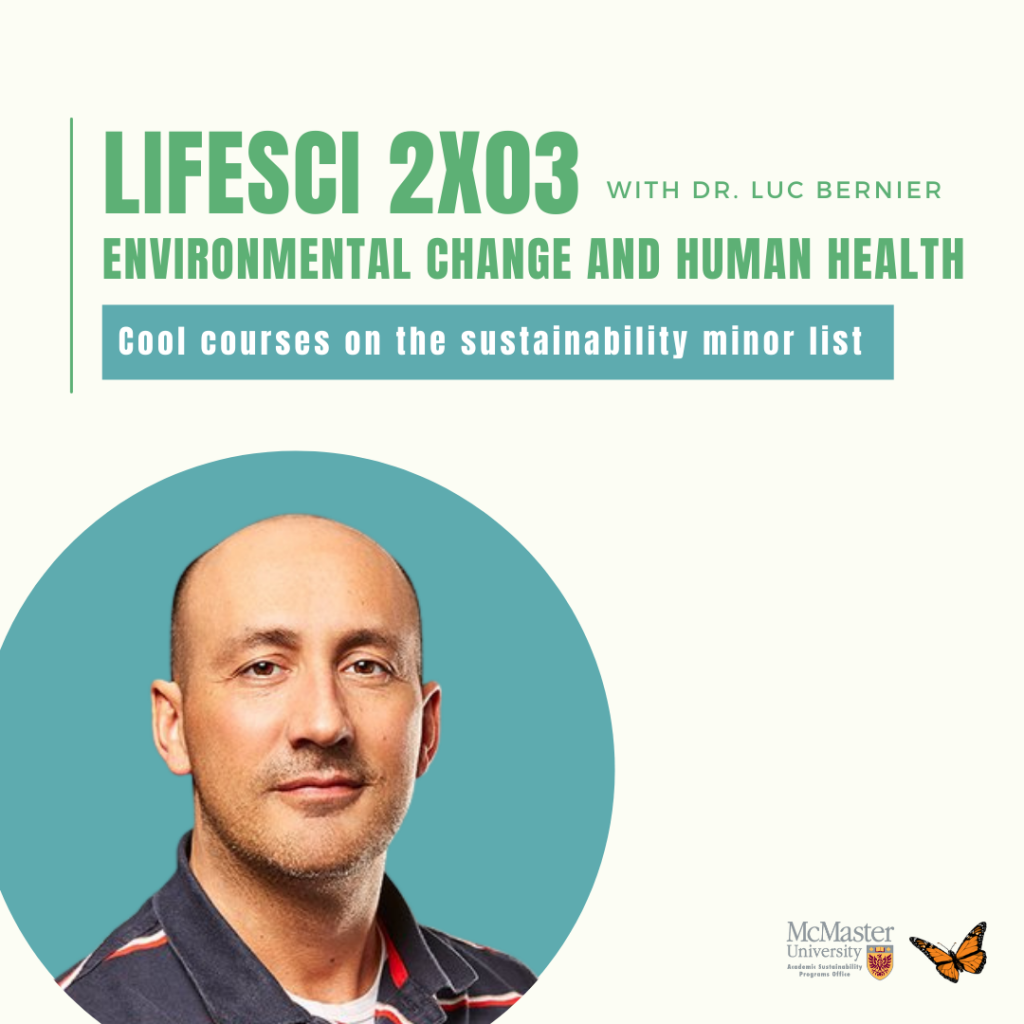Overview
The scope and definition of sustainability used for the Minor are guided jointly by the United Nations Sustainable Development Goals and the Association for the Advancement of Sustainability in Higher Education (AASHE). In selecting our course list we have adopted AASHE’s definitions below:
To count as sustainability-focused, the course title or description must indicate a primary and explicit focus on sustainability as defined by the UN SDGs. This includes:
- Foundational courses with a primary and explicit focus on sustainability (e.g., Introduction to Sustainability, Sustainable Development, Sustainability Science).
- Courses with a primary and explicit focus on the application of sustainability within a field (e.g., Architecture for Sustainability, Green Chemistry, Sustainable Agriculture, Sustainable Business).
- As sustainability is an interdisciplinary topic, such courses generally incorporate insights from multiple disciplines.
- Courses with a primary and explicit focus on a major sustainability challenge (e.g., Climate Change Science, Environmental Justice, Global Poverty and Development, Renewable Energy Policy). The focus of such courses might be on providing knowledge and understanding of the problems and/or the tools for solving them.
The course title or description does not have to use the term “sustainability” to count as sustainability-focused if the primary and explicit focus of the course is on the interdependence of ecological and social/economic systems or a major sustainability challenge. If the course title and description do not unequivocally indicate such a focus, but it is evident from the course description or syllabus that the course incorporates sustainability challenges, issues, and concepts in a prominent way, the course may qualify as ‘sustainability-inclusive’.
Objectives
To achieve our goal of developing students’ interdisciplinary knowledge and understanding of sustainability, the Minor provides a path for students to study diverse aspects of sustainability by taking courses from different Faculties and integrating them into a cohesive whole. The specific objectives of the Minor are as follows:
- Promote engagement among students, faculty, and staff across the University, facilitating interdisciplinary learning.
- Offer a wide selection of courses to enable students to choose the sustainability emphasis that is right for them and to pursue courses that will further their individual learning objectives.
- Provide opportunities to meaningfully engage with communities both within and outside of McMaster.
- Encourage opportunities for student experiential learning about sustainability.
Reporting
Through the development and implementation of McMaster’s Interdisciplinary Minor in Sustainability, students are now able to choose from 83 courses from Faculties across campus to gain a truly interdisciplinary perspective of sustainability as well as tailor a minor that complements their major. In seven years of operation, 197 students have graduated with an Interdisciplinary Minor in Sustainability.
Collaborators
The Minor would not be possible without the hard work and dedication of the past and current members of the Interdisciplinary Minor in Sustainability Committee; the Arts & Science Program for providing an administrative home for the Minor; the faculty members who have opened up their courses for inclusion and helped communicate the Minor; the staff members, including academic advisors, who have provided advice and guidance throughout; and the dozens of students who have shown their support by taking the Minor and working with us through its development.
Requirements
For the most up-to-date requirements, please visit the link to this year’s course calendar.
Expandable List
No more than 6 units from Level 1 courses
Any 3 units from the following list of SUSTAIN courses may count towards this requirement:
SUSTAIN 1S03 – Introduction to Sustainability;
SUSTAIN 2S03 – Evaluating Problems & Sustainable Solutions;
SUSTAIN 2lS3 – Intersectionality & Sustainable Development;
SUSTAIN 2SD3 – Exploring the United Nations Sustainable Development Goals;
SUSTAIN 3S03 – Implementing Sustainable Change;
SUSTAIN 4S06 – Leadership in Sustainability
Selected from two or more Faculties as outlined by the Interdisciplinary Minor in Sustainability Course list in the Undergraduate Calendar.
Any cross-listed course between two or more Faculties and those of interdisciplinary programs will be counted as a course outside of the student’s home Faculty. ENVIRSC and EARTHSC courses are administered by the Faculty of Science. ENVSOCTY and GEOG courses are counted as Social Sciences courses.
Sustain courses do not count towards units outside a student’s home Faculty.
NOTES
Student requests for course substitution can be completed using the request template and sent to Minor Committee Co-Chair Kate Whalen at whalenk@mcmaster.ca. The Request for Course Substitution template can be found at the appropriate tab above.
- Students should note that not all courses listed are available each year. As well, it is the student’s responsibility to check carefully for prerequisites, co-requisites and enrolment restrictions.
- Students are strongly encouraged to seek guidance from their academic advisor to ensure they are meeting all enrolment requirements, including Faculty-specific requirements for double counting courses required for a student’s major.
- All courses have enrolment capacities. The Faculty cannot guarantee enrolment in courses for minors, even when prerequisites have been met.
- ENVIRSC and EARTHSC courses are administered by the Faculty of Science.
- ENVSOCTY and GEOG courses are counted as Social Sciences courses.
Committee
Roles and Responsibilities
The roles and responsibilities of the Committee are as follows:
- Establish goals for the development and enhancement of the Minor and report annually on progress made
- Promote the Minor, including Sustain 1S03 and other courses on the Minor Course List
- Advise on the administrative processes involved, such as course exception process, course list, requirements, etc.
- Consult with Faculty colleagues on the course list and other administrative aspects
- Approve the course list, specifically for courses under each member’s home Faculty. Offer insight on courses outside home Faculty.
- Provide pan-campus perspective as it relates to development and management of the Minor
Guiding Principles
McMaster’s Minor in Sustainability is guided by the following principles:
- Provide students with foundational sustainability knowledge
- Create a consciousness and respect for the diversity of sustainability perspectives held in different Faculties
- Ensure an interdisciplinary educational experience
- Encourage and support student-directed learning
- Complement existing McMaster educational offerings while avoiding redundancy
- Ensure inter-Faculty equity, including student accessibility
Meeting Frequency
Twice annually in July and November
Membership – 2022/2023
| Member | Faculty | Department | Contact Information |
|---|---|---|---|
| Kate Whalen, Co-Chair | Academic Sustainability Programs Office | whalenk@mcmaster.ca | |
| Brent McKnight, Co-Chair | Business | Strategic Management | bmcknight@mcmaster.ca |
| Shelley Anderson, Academic Program Administrator | Arts & Science | Arts & Science | anderso@mcmaster.ca |
| Addisu Lashitew | Business | Strategic Management | lashitea@mcmaster.ca |
| Jim Cotton | Engineering | Mechanical Engineering | cottonjs@mcmaster.ca |
| Shelir Ebrahimi | Engineering | Chemical Engineering | shelir.ebrahimi@mcmaster.ca |
| Stacey Ritz | Health Sciences | Health Sciences | ritzsa@mcmaster.ca |
| Derek Woods | Humanities | Communications and Multimedia | woodsd11@mcmaster.ca |
| Susie O’Brien | Humanities | English and Cultural Studies | obriensu@mcmaster.ca |
| Luc Bernier | Science | Earth, Environment & Society | berniejm@univmail.cis.mcmaster.ca |
| Chad Harvey | Science | Integrated Science (iSci) Program | harvech@mcmaster.ca |
| Adrianne Lickers Xavier | Social Sciences | Indigenous Studies | xavier@mcmaster.ca |
| Aubrey Cannon | Social Sciences | Anthropology | cannona@mcmaster.ca |
Student committee
Roles and Responsibilities
The roles and responsibilities of the Student Sub-Committee are as follows:
- Promote the Minor and increase student awareness about sustainability education at McMaster
- Provide opportunities to meaningfully engage with the McMaster community
- Encourage opportunities for student experiential learning about sustainability
Meeting Frequency
Weekly meetings from September to April.
Get Involved
To join the Student Sub-Committee, email us at asp@mcmaster.ca
Membership – 2023/2024
|
Member |
Role |
Department/Faculty |
Level |
Contact Information |
|---|---|---|---|---|
|
Kate Whalen |
Student Committee Liaison |
Academic Sustainability Programs Office |
N/A |
|
|
Nathan Butterworth |
Student Committee Coordinator |
Academic Sustainability Programs Office |
N/A |
|
| Simran Jolly | Student Member | Arts & Science | 3 | jollys4@mcmaster.ca |
|
Gabriel Lonuzzo |
Student Member |
Engineering |
3 |
|
| Fiona Sharpe | Student Member | Social Science | 5 | sharpef@mcmaster.ca |
| Roxann Forget | Student Member | Health Sciences | 3 | forgetr@mcmaster.ca |
| Mohammad Amjad | Student Member | Science | 5 | amjadm8@mcmaster.ca |
| Hannah Shouldice | Student Member | Business (IBH) | 3 | shouldh@mcmaster.ca |
| Areeb Iqbal | Student Member | Business | 4 | iqbala27@mcmaster.ca |
|
Runisan Natheeswan |
Student Member |
Science |
3 |
|
| Yifan Wang | Student Member | Humanities | 4 | wangy850@mcmaster.ca |
Request Course Substitution
Students wishing to have a sustainability-related course, which is not currently on the Sustainability Minor Course List, and have it count towards their minor are encouraged to email asp@mcmaster.ca with the following information:
- Your Name:
- Your Home Faculty:
- Your Program of Study
- Level of Study:
- Faculty (of the course you are submitting the request for):
- Program (of the course you are submitting the request for):
- Course Code and Title:
- Course Outline (link or attach a copy):
- Name and Email of Course Instructor (who taught when you took the course):
- Have you had any other courses approved for substitutions?
- If yes, please list using Course Code and Title:
- Name of the academic advisor you have been working with in your home Faculty, if appropriate. If you haven’t been working with a specific advisor, that’s fine too.
- Describe how this course, and/or what you have done in this course, contributes to your learning about sustainability and your sustainability minor. Connecting your learning to one or more of the UN Sustainable Development Goals (see here or here) is encouraged. Additional information on each Sustainable Development Goal can be found by reading the associated Indicators and Targets.
Nominate a Cool Course
We are looking to hear from students about the cool course(s) you’ve taken that counts towards McMaster’s Interdisciplinary Minor in Sustainability. We want to share your favourites on our social media for others to see!
Expandable List
Nominated courses must meet the following requirements:
- Undergraduate course at McMaster
- Counts towards the Interdisciplinary Minor in Sustainability (see list here)
- Nominated by a student who has completed the course
If the course you want to nominate meets the criteria above, and you approve of us sharing the information you provide, please email asp@mcmaster.ca your response to the following:
1. Name of professor and course code you are nominating
2. Write a 1-2 sentence testimonial about why this course is cool and/or how it enhanced your sustainability education
3. Include your name, Faculty, and level of study
4. Provide us with your Facebook name and/or Instagram handle to be tagged (optional)
5. Provide us with a photo to be included in the post (optional)
After submitting your nomination, our team will connect with the professor and invite them to collaborate on a post by providing some more information about them and their course. Our team will create the social media graphic and content, have it approved by the student and professor, and post it on the @macsustain Instagram and Facebook accounts.
Check out a few Cool Courses that were nominated already!



